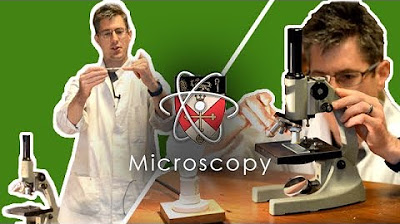How to Use a Microscope | STEM
Summary
TLDRProfessor Murry Gans introduces viewers to the non-majors biology lab at Eastfield College, focusing on the proper use of a light microscope. The tutorial covers microscope parts, including eyepieces and objective lenses, and their magnification capabilities. It demonstrates how to prepare a wet mount slide, adjust lighting, and focus the microscope, emphasizing the importance of starting with low power and gradually increasing magnification for clarity. The video also highlights the need for proper microscope care and preparation for lab classes.
Takeaways
- 🔬 Professor Murry Gans introduces a non-majors biology lab at Eastfield College, focusing on the use of a light microscope.
- 📚 The lab aims to familiarize students with microscope operation before attending the lab in person.
- 🔍 Microscopes use a series of lenses to magnify objects, with the potential to magnify up to 400 times using multiple lenses.
- 👀 The microscope has eyepieces (oculars) that magnify 10x and objective lenses with varying magnification powers: 4x, 10x, and 40x.
- 💡 The microscope has three light adjustments: a power switch, a diaphragm to control light intensity, and a dimmer switch.
- 📌 The mechanical stage on the microscope stage holds the slide and allows for movement to position the specimen.
- 🔭 To use the microscope, start with the low power objective for a larger field of view, then proceed to medium and high power as needed.
- 🔧 There are two focusing knobs: the coarse focus for larger adjustments and the fine focus for precise focusing.
- 🧼 Before using the microscope, clean the lenses with lens paper to ensure clear viewing.
- 🌡️ For wet mount slides, place the specimen on a slide, add a drop of water, and carefully place a cover slip to minimize air bubbles.
- 📈 When adjusting the microscope, center the specimen at each magnification level before increasing to a higher power.
- 🧼 After use, properly clean and store the microscope, including removing and disposing of the cover slip and returning the slide to its box.
Q & A
Where is the non-majors biology lab located?
-The non-majors biology lab is located at Eastfield College in Mesquite, Texas.
What is the primary focus of the video?
-The primary focus of the video is to demonstrate how to use a light microscope for lab purposes.
How should you carry a microscope to your table?
-You should grab the microscope by the handle on the arm and support it with your other hand under the base, holding it close to your body as you carry it to your table.
What is the magnification power of the eyepieces or oculars?
-The eyepieces or oculars magnify the specimen 10 times.
What are the different magnification powers of the objective lenses?
-The objective lenses have different magnification powers: the short one is 4x, the next one is 10x, and the next one is 40x.
How can you control the amount of light that reaches the specimen?
-You can control the amount of light that reaches the specimen by adjusting the diaphragm, which is a ring mounted under the microscope.
What is the purpose of the mechanical stage on the microscope?
-The mechanical stage is used to hold the slide and allows you to move it around for better observation.
How do you properly clean the lenses of the microscope?
-You should use lens paper to clean each of the eyepieces and objective lenses by tearing a sheet from the booklet, wadding it up, and wiping the lenses.
What is a wet mount slide and how is it made?
-A wet mount slide is a technique used in biology to mount specimens in water. It is made by placing a specimen on a slide, adding a drop of water, and then carefully placing a cover slip over it to avoid air bubbles.
What is the correct order of magnification when using the microscope?
-The correct order of magnification when using the microscope is to start with low power, then move to medium power, and finally to high power.
How should you store the microscope after use?
-After use, you should remove the slide, clean the slide if necessary, turn off and unplug the microscope, wrap the cord, cover it with the microscope cover, and carry it back to the cabinet by the arm and supporting the base.
Outlines

Cette section est réservée aux utilisateurs payants. Améliorez votre compte pour accéder à cette section.
Améliorer maintenantMindmap

Cette section est réservée aux utilisateurs payants. Améliorez votre compte pour accéder à cette section.
Améliorer maintenantKeywords

Cette section est réservée aux utilisateurs payants. Améliorez votre compte pour accéder à cette section.
Améliorer maintenantHighlights

Cette section est réservée aux utilisateurs payants. Améliorez votre compte pour accéder à cette section.
Améliorer maintenantTranscripts

Cette section est réservée aux utilisateurs payants. Améliorez votre compte pour accéder à cette section.
Améliorer maintenantVoir Plus de Vidéos Connexes

BIOLOGY 10 - Basic Microscope Setup and Use

Praktikum Pengenalan dan Penggunaan Mikroskop | Biologi Umum | UPT Laboratorium Terpadu UHO

Microscopy - How to use a microscope - GCSE Science Required Practical

CSL FK - CSL 1 Pengenalan Mikroskop

How To Use a Compound Microscope

How do you use a Light Microscope? A step-by-step guide!
5.0 / 5 (0 votes)
